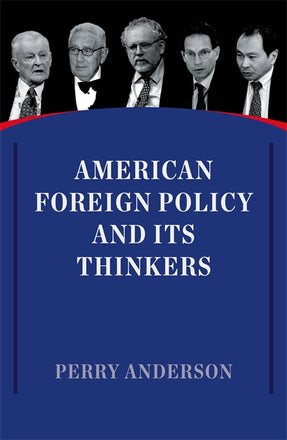Paperback
+ free ebook

+ free ebook
Magisterial account of the ideas and the figures who have forged the American Empire
Since the birth of the nation, impulses of empire have been close to the heart of the United States. How these urges interact with the way the country understands itself, and the nature of the divergent interests at work in the unfolding of American foreign policy, is a subject much debated and still obscure. In a fresh look at the topic, Anderson charts the intertwined historical development of America’s imperial reach and its role as the general guarantor of capital.
The internal tensions that have arisen are traced from the closing stages of the Second World War through the Cold War to the War on Terror. Despite the defeat and elimination of the USSR, the planetary structures for warfare and surveillance have not been retracted but extended. Anderson ends with a survey of the repertoire of US grand strategy, as its leading thinkers—Brzezinski, Mead, Kagan, Fukuyama, Mandelbaum, Ikenberry, Art and others—grapple with the tasks and predicaments of the American imperium today.
Like everything Anderson writes, American Foreign Policy and Its Thinkers deserves careful reading. He’s one of the world’s great historians, unrivalled in his ability to master and synthesize vast historical literatures (often drawing on many languages).
The most interesting implication of Anderson’s argument is that the long catalog of US foreign policy disasters—the overthrow of Mohammad Mossadegh in Iran in 1953, the Bay of Pigs fiasco in 1961, the twin quagmires of Vietnam and Iraq—were more than just errors of presidential judgement. They were the price America recurrently pays for the hubristic embrace of a messianic foreign policy, one that never disciplined its priorities according to rationally defined national interests.
His writing is sharp and erudite and even those who do not share his politics will learn from his book.
Anderson is among the most insightful and policy-relevant analysts of modern Europe
One of the best political, historical and literary essayists of the age.
American Foreign Policy and Its Thinkers plunges into the contemporary American dreamworld of empire. Anderson has always been attracted to those who speak of the world without euphemism, and he appraises the recent offerings of American "Grand Strategists" with sardonic respect, however rabid or fantastic their conceptions.
Revives memories of the early-1960s vintage, anti-Wilsonian idealism classic, William Appleman Williams's The Tragedy of American Diplomacy.
Anderson surveys the views of some of the most prominent mainstream American foreign policy intellectuals and finds them not only unconvincing but also incoherent.
Let me first get the superlatives out of the way. What we have here are two essays of extraordinary originality and penetrating insight. Sweeping, subtle, sophisticated, provocative, pungently written: all of the above apply.
The leading British New Left historian masterfully examines and critiques how leading American thinkers and policymakers have conceptualised and shaped America’s role in the world since its emergence as a global superpower.